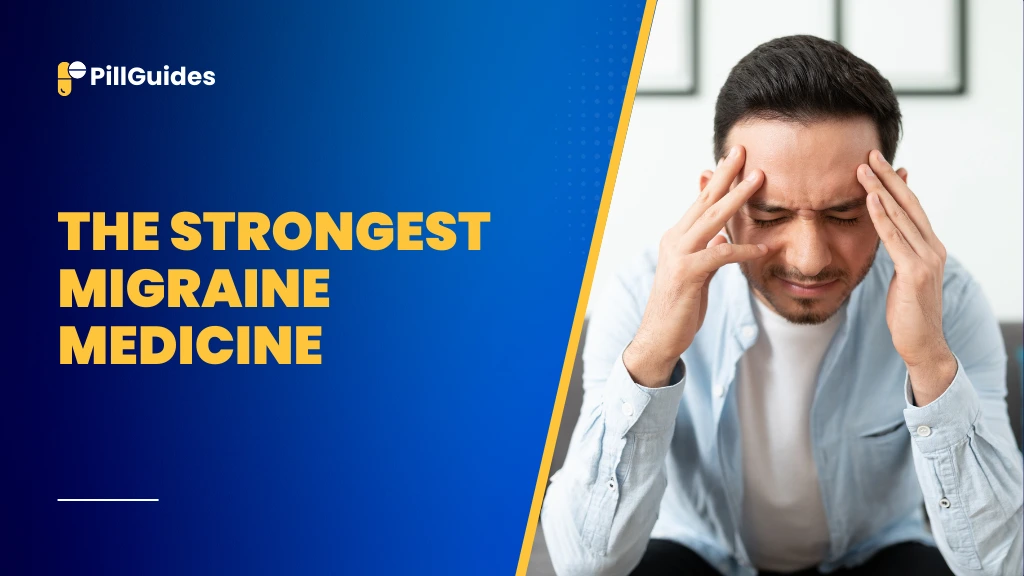Millions worldwide suffer from migraines. Migraines can be mild or severe and in the latter case you would need strong issues. If you’re looking for the strongest migraine medicine, this post will guide you to find effective treatments that are beneficial, how they work, and how they help you in relieving one.
Understanding Migraines and Their Triggers
Migraines are more than severe headaches. They’re difficult neurological conditions that often include symptoms such as nausea, sensitivity to light and sound, and throbbing pain on one side of the head.
Common Migraine Triggers
- Stress
- Hormonal changes (especially in women during menstruation or pregnancy)
- Certain foods (like chocolate, cheese, and processed meats)
- Alcohol and caffeine
- Sleep disruptions
- Environmental factors (such as bright lights or strong smells)
The first step towards managing migraines is to understand and avoid these triggers.
Strongest Prescription Migraine Medicines
If over the counter options aren’t working, prescription meds are used. Below are some of the strongest and most effective medicines for migraine relief:
1. Triptans
Acute migraines are most often treated with triptans. The work they do is to shrink the blood vessels and reduce brain inflammation.
- Examples: Rizatriptan (Maxalt), Sumatryptan (Imitrex)
- Best For: Individuals with moderate or severe migraines with aura.
- Side Effects: Mild dizziness, drowsiness or mild nausea.
2. CGRP Inhibitors
Many of the newer classes of drugs targeted at preventing migraines and treating it are also called Calcitonin gene related peptide (CGRP) inhibitors.
- Examples: Fremanezumab (Ajovy), Erenumab (Aimovig)
- Best For: People with chronic migraine who need relief on a long term basis.
- Side Effects: Mild fatigue, or injection site reactions.
3. Dihydroergotamine (DHE)
DHE medications are for severe migraines that do not respond to other treatments. They contract blood vessels and attack creating pain pathways.
- Examples: D.H.E 45 (Injectable) and Migranal (Nasal spray)
- Best For: Patients with persistent migraines longer than 24 hours.
- Side Effects: Vomiting, nausea, or dizziness.
4. Anti-Nausea Medications
For those who suffer with very nasty nausea, these are often also prescribed in conjunction with migraine medicines.
- Examples: Metoclopramide (Reglan), Prochlorperazine (Compazine)
Over-the-Counter (OTC) Migraine Relief
While not as strong as prescription drugs, some OTC medications can still provide significant relief:
1. Non Steroidal Anti Inflammatory Drugs (NSAIDs)
- Examples: Ibuprofen (Advil), Naproxen (Aleve)
- Benefits: Mild to moderate migraines relief when taken at the onset.
2. Acetaminophen
- Examples: Tylenol
- Benefits: It’s safe for people who can’t take NSAIDs.
3. Combination Medications
Sometimes, OTC drugs are combined with pain relievers and caffeine for maximum effect.
- Examples: Excedrin Migraine
Preventive and Alternative Treatment
For those seeking alternatives or long-term preventive solutions, the following options may help:
1. Botox Injections
Botox is FDA approved for use in chronic migraines. It loosens muscles and stops pain signals from getting to your brain.
2. Anticonvulsants and Antidepressants
For migraine prevention these medications, such as Amitriptyline or Topiramate, are often prescribed.
3. Lifestyle Adjustments
- A consistent sleeping time.
- Sinatra advises you to do things like yoga or meditation to practise stress relief.
- Avoiding the trigger foods, eating a balanced diet
4. Natural Remedies
- Magnesium supplements: Very effective for preventing the frequency of migraine.
- Essential oils: Mild symptoms may be treated with lavender and peppermint oils.
How to Choose the Right Migraine Medicine
Selecting the strongest migraine medicine depends on factors like:
- Severity of symptoms
- Frequency of migraines
- Personal health conditions
- Potential side effects
You should always consult a healthcare professional before you start any new treatment.
The Role of Diet and Hydration in Managing Migraines
Preventing and managing migraines depends greatly on diet and hydration. It is known that certain foods and beverages can either activate or deactivate symptoms in each individual.
1. Foods to Avoid
- Aged cheeses: Tyramine rich which can cause migraines.
- Processed meats: May contain nitrates that make headaches worse.
- Alcohol: Beer and red wine are typical migraine triggers.
- Caffeinated beverages: Caffeine can help ease symptoms, but using too much or not using it enough may trigger migraines.
2. Foods That Help
- Magnesium-rich foods: In reducing the frequency of migraine, spinach, almonds and avocados may play a role.
- Omega-3 fatty acids: These are found in salmon and flaxseeds.
- Ginger: It is actually known for its anti-nausea properties and can be very soothing during a migraine.
3. Importance of Hydration
Migraine is a common migraine trigger. Make sure you get 8 to 10 glasses of water a day, and try an electrolyte rich drink in the summer or on a heavy day of activity.
Medication and other treatments can go a long way, but the effects can be enhanced by the way you eat and drink, especially if you choose your food and beverages properly and stay adequately hydrated.
Lifestyle Changes to Prevent Migraines
Medication is combined with lifestyle changes to decrease how often and how bad your migraines are. These proactive steps can also be taken in conjunction with medical treatments and help with general wellness.
1. Regular Sleep Schedule
- Keep your bedtime, and wake up time the same as much as you can, even on weekends.
- It can cause migraines if you avoid oversleeping.
- Improving sleep quality creates a calming bedtime routine.
2. Stress Management Techniques
- Take up relaxation methods like yoga, meditation or deep breathing exercises.
- Do stuff that lowers your stress levels.
- Think about cognitive behavioural therapy (CBT) for chronic stress.
3. Physical Activity
- Do moderate exercises such as walking, swimming or cycling every morning.
- Sometimes over exertion can trigger migraine, so avoid overexertion.
4. Limiting Screen Time
- Always take short breaks when you work on the screens to reduce eye strain.
- Use blue-light filters, especially in the early evening hours, as well as adjust your screen brightness.
5. Keeping a Migraine Diary
- Monitor when someone gets a track, a symptom, or medication is successful.
- This diary can be used to identify the patterns and change the lifestyle habits as per.
Making adjustments like that means that individuals can reduce the possibility of migraines by a great deal and consequently their overall quality of life also.
Conclusion
If you have migraines, it’s a debilitating condition and one that can really affect your day to day life, but with the right approach you can manage them well. An important step in relieving migraine is in identifying and using the strongest migraine medicines that are right for you. Medication, though, is not the only answer. Dietary changes, drinking, lifestyle modifications, and stress control are complementary strategies to prevent and reduce the number of migraine episodes.
Our understanding of migraines is that you can develop strategies to manage your triggers, seek proper treatment from healthcare professionals, and adopt healthy habits, not only to minimize your episodic attacks, but also in terms of improving your life. I also advise you to always keep talking to your doctor and be monitoring your progress to get the best results possible.
Disclaimer
The information contained in this article is for informational purposes only, and should not be considered medical advice. The use is always for diagnosis and treatment; as always consult your healthcare provider.
To control your migraines and improve quality of life, understanding the strongest migraine medicines and those alternatives can make all the difference.
Read More: How Much Does a Half Ounce of Cocaine Weight? Exploring the Facts
FAQs The Strongest Migraine Medicine
1. What is the best migraine medication?
Treatment for severe migraines includes triptans and CGRP inhibitors.
2. Can over the counter medications treat migraines?
NSAIDs like ibuprofen or combination medications like Excedrin are effective in mild to moderate migraines.
3. Can migraines be prevented using natural remedies?
Yes, magnesium supplements, essential oils and relaxation techniques can help and lower the severity of mild migraines.
4. Can Botox really help with migraines?
Yes, Botox is FDA approved for chronic migraines, and it has been shown to reduce how frequent they become, and how severe they are.
5. Can you safely take migraine medication constantly?
Medication-overuse headaches can be caused by long term, or frequent use, of certain medications. Consult your doctor before making any decision.










